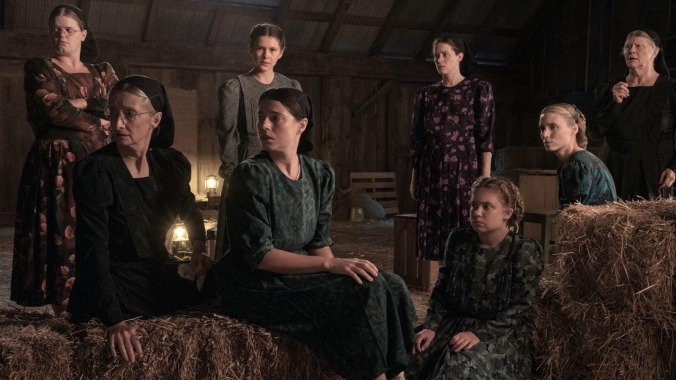Women Talking review: the feminist struggle comes to a religious commune in Sarah Polley’s powerful drama
Rooney Mara, Jessie Buckley, and Claire Foy debate forgiveness and faith in this fact-based story about sexual abuse
Film Reviews Sarah Polley
Women Talking is a story that is neither showy nor conventionally cinematic. Miriam Toews’ novel is largely an expression of ideas through discussion in a single location, with conversational threads blurring together in prose resembling hastily scribbled notation. Writer-director Sarah Polley’s big screen adaptation is largely faithful to that tone and style, allowing its central debate to play out with minimal interruption by on-screen dramatic incident. However, it’s what’s not there that makes Women Talking stand out, if not precisely as an exemplar of dramatic cinema, then as a collaborative communion of feminine voices taking a stand against violence.
Inspired by heartbreakingly real events in a Bolivian Mennonite colony around 2010, Women Talking follows the hayloft conversation of Mennonite women as they come to grips with having been systematically drugged and sexually assaulted by men of their colony over a period of years. Faced with the reality that they and their children are not safe in a society that would protect their attackers by gaslighting the victims into believing they were being punished by Satan, the women come to realize that their only options are to either stay and fight for their rights or leave into the unknown outside world.
That setup allows for wide-ranging discussions about women’s liberation and a deconstruction of patriarchal structures that are incredibly specific to the isolated world of a technologically regressive society while also philosophically applicable more broadly to the roles that women have as mothers, wives, and people of faith. For a story that is foundationally built on conflict through conversation, Polley’s dialogue—often borrowing directly from Toews’ text—is compelling without the necessity of graphic depictions of traumatic events. Instead, it focuses on fragmentary flashbacks of an assault’s aftermath to demonstrate its emotional impact, trusting that the audience understands the horror of sexual violation without demanding that we experience it by proxy.
Polley reportedly adopted a very collaborative style in directing the film, rejecting an auteurist mindset in guiding her cast and crew. That ethos comes through in performances that are emphatic without any being absolute show stealers. Ostensible lead Rooney Mara portrays a woman made pregnant by her attacker yet she still holds love in her heart as she mediates the discussion with her Mennonite sisters. Contrast this with Jessie Buckley and Claire Foy, who express their trauma through defensive posturing and calls to violent rebellion, though their individual reasons for doing so are disturbingly divergent. These big names certainly turn in performances that will grab conventional awards attention. But the whole ensemble delivers nuanced, devastating, and sometimes even humorous work, from matriarchal actresses Judith Ivey and Sheila McCarthy to younger players Kate Hallett, Liv McNeil, and Michelle McLeod. Their interplay suggests a kaleidoscopic view of patriarchal oppression and the various ways to react to it, which Polley’s collaborative vision enables to great effect.
However, that desire to be holistic does have its drawbacks, particularly with regard to characters that function better in the novel’s ramblingly lived-in approach as opposed to a film where extraneous elements can often feel vestigial. Sometimes these faults are minor, as with Ben Whishaw playing a formerly ex-communicated schoolteacher asked to keep the minutes of the meeting as the only literate sympathizer to their cause. In the novel, this character serves as narrator and subjective observer with a perspective that contrasts Mennonite society to the outside world. This is, cinematically speaking, a superfluous role that causes a late third-act revelation to feel unnecessarily forced. Thankfully, he still serves an important role as a demonstration that men are capable of listening, growing, learning, and changing, a necessary counterpoint to calls to villainize men as lost causes or inherent dangers.
Less compellingly realized, however, is a transgender young man, played by August Winter, who realizes his identity in the aftermath of his assault. Though the dialogue takes great pains to point out that the assault did not traumatize the character into his transgender identity, it does come across as a footnoted experience in a purposely mute character who does not otherwise contribute much to the discussions at play. Even more baffling is the casting of Frances McDormand as an early objector who leaves the meeting in the opening scenes, representing the contingent of womanhood who feels that the burdens of patriarchal abuse are their duty to bear. Though this role draws an important contrast within the narrative, it feels like a waste to have a talent like McDormand mainly perform a mere handful of silent, severe stares.
Still, Women Talking is about as direct as cinema gets in portraying the complexities and nuances of the feminist struggle, and it achieves much with characters who wouldn’t likely consider themselves feminist or revolutionary. Though it lacks a singular voice to tie its themes and conflicts together, that wholly intentional choice allows for a film that speaks to a variety of experiences, making for a uniquely choral cinematic drama. In some ways, Polley and her team bite off more than they can chew, but it’s the moments of real human connection that make Women Talking a success.